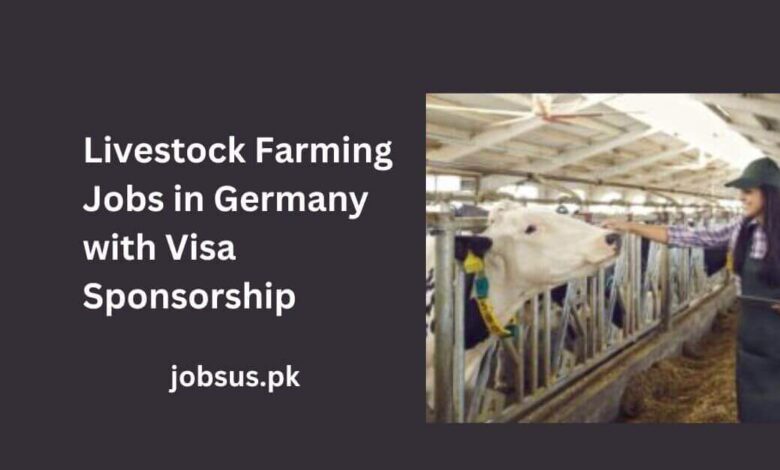Livestock Farming Jobs in Germany with Visa Sponsorship 2025

In 2025, Germany’s agricultural sector provides a variety of opportunities for individuals who are interested in Livestock Farming Jobs with Visa Sponsorship. These positions are indispensable for the preservation of the nation’s exceptional agricultural and animal husbandry standards.
Check Also: Visa Sponsorship Skilled Jobs in Germany – Apply Now

Demand for Livestock Farming Jobs in Germany:
The demand for qualified laborers in the livestock husbandry sector is primarily driven by the necessity of adhering to stringent directives and maintaining high-quality standards. As Germany continues to prioritize ethical and practical agricultural practices, there is a consistent need for individuals with specialized knowledge in animal husbandry, veterinary care, and farm management.
Sponsorship of Visas for Jobs in Livestock Farming:
This process frequently involves obtaining a critical work visa in order to secure employment in livestock husbandry in Germany. Employers who comprehend the importance of foreign expertise in upholding the nation’s rigorous agricultural standards frequently advocate for visas. The EU Blue Card is intended for non-EU laborers who are exceedingly qualified, whereas the German Work Searcher Visa is intended for individuals who are seeking employment.
Germany’s Livestock Farming Jobs: Advantages:
- In Germany, animal husbandry occupations are frequently compensated at competitive rates, which is indicative of the nation’s commitment to providing equitable compensation for skilled labor and its robust economy.
- Quality of Life: Germany consistently achieves high rankings in global quality of life evaluations. Animal husbandry professionals can appreciate a high standard of living, outstanding healthcare, and a well-developed infrastructure.
- Cultural Experience: Working in Germany offers the enticing opportunity to fully immerse oneself in the affluent German culture, which includes traditional festivals and the vibrant art scene.
- Germany’s livestock husbandry is distinguished by its advanced, efficient facilities, which utilize state-of-the-art innovations to improve animal welfare and efficiency.
- Environmental Sustainability: Germany prioritizes economic improvement. The opportunity to contribute to environmentally favorable practices and be a part of a nation that is dedicated to environmental responsibility is available to individuals employed in an animal husbandry profession.
- Education and Training Opportunities: Germany offers access to high-quality education and training programs, which allow individuals to improve their abilities and remain informed about the most recent agricultural improvements.
- Social Security Benefits: In Germany, employees are appreciative of the comprehensive social security benefits that include pension schemes, unemployment benefits, and well-being insurance.
- Multicultural Work Environment: The overall experience is enhanced by the multicultural work environment that is fostered by the recruitment of professionals from a diverse range of backgrounds into livestock husbandry positions.
- Job Security: The agricultural sector, a critical component of Germany’s economy, offers stability and security to individuals involved in animal husbandry.
- Work-Life Balance: The German work culture places a high value on a healthy work-life balance, which enables individuals in the livestock husbandry industry to pursue a fulfilling career while also valuing their personal lives.
Qualifications and Skills:
- Relevant Education: A background in agriculture, veterinary science, or a related discipline is often required for livestock husbandry positions.
- Work Experience: In Germany, managers generally prioritize candidates who have experience in animal husbandry. Prior employment experience may offer a substantial advantage.
- Language Proficiency: Although English may be adequate for certain roles, the ability to communicate effectively in both professional and personal settings is significantly enhanced by proficiency in German.
- Visa Requirement: Ensure that the visa requirements for employment in Germany are met. This may entail the procurement of a work visa or a Blue Card for highly talented employees.
- Health Protections: It is imperative that individuals employed in Germany possess an adequate level of health insurance coverage. Guarantee that you possess the necessary health insurance policies.
- Job Offer: It may be crucial to secure a job offer from a German manager. The probability of obtaining a work visa is enhanced by the existence of a concrete offer.
- Proof of Financial Stability: The provision of financial stability proof is a testament to your capacity to maintain oneself in Germany. This may encompass substantiation of bank statements and accommodations.
- Cultural Flexibility: Demonstrate your capacity to adjust to the German work culture and lifestyle. Employers frequently emphasize social adaptability.
- Valid Passport: Ensure that your visa is valid for the duration of your intended stay in Germany. Confirm the precise prerequisites for passport validity.
- Networking: The establishment of professional associations within the German agricultural sector can substantially improve your employment prospects. Establish connections with professionals and attend industry events to expand your network.
Obligations in Livestock Farming Jobs:
- Animal Welfare:
- Ensure the health and welfare of animals by providing them with the necessary nutrition, housing, and medical care. This entails the examination of the health and behavior of animals.
- Breeding Management:
- Supervise the delivery of animals, oversee the management of reproduction forms, and implement breeding programs. Maintain accurate records of reproductive activities.
- Herd Health Management:
- Vaccination schedules, disease prevention measures, and well-being guidelines are implemented to guarantee the animals’ overall health.
- Nutrition and Feeding:
- Formulate and execute balanced nutrition strategies for animals at different stages of development. Monitor the feed’s condition and modify the rations as needed.
- Maintenance of the Facility:
- Perform routine inspections and maintenance of farm infrastructure, such as equine shelters, walls, and equipment. Promptly resolve any necessary repairs to ensure a secure and efficient work environment.
- Data Acquisition:
- Maintain exhaustive records of animal activities, including pregnancies, fatalities, and medications for well-being. The management and compliance of farms are contingent upon precise record-keeping.
- Herd Movement and Management:
- Coordinate the development of animals for a multitude of purposes, such as transportation, reproduction, and sustenance. In an effort to alleviate the stresses that animals endure, implement suitable animal management protocols.
- Environmental Compliance:
- Adhere to environmental regulations and sustainable cultivation practices. Manage the disposal of waste and implement strategies to mitigate the farm’s biological impact.
- Equipment Operation:
- Operate and maintain farm apparatus and equipment, such as tractors, drainage machines, and feeding systems.
- Working together:
- Assist in the efficient operation of the animal farm by collaborating with farm personnel, veterinarians, and other experts.
- Market Awareness:
- Maintain awareness of market trends, estimations, and the demand for animal products. Adjust agricultural practices to meet the demands of the market.
- Continuous Education:
- Ensure that you are informed about the latest developments in the industry, technology, and animal husbandry practices. Participate in extensive seminars or training sessions to improve one’s capabilities.
Application Procedure:
- Find livestock farming positions in Germany by visiting agricultural websites, using online work portals, or contacting farms directly.
- Arrange your curriculum vitae to emphasize your education and abilities, as well as your substantial experience in animal husbandry.
- Submit your visa application to the German Consulate or Embassy in your country of residence. Ensure that all necessary documentation is submitted and that the corresponding fees are paid.
Conclusion:
Livestock farming occupations in Germany offer an intriguing opportunity to contribute to a prospering industry and be exposed to the country’s rich agricultural heritage. This division offers the opportunity for individuals who have a commitment to sustainable farming, a combination of practical experience, and germane capabilities to pursue rewarding career paths. This division also provides the benefit of visa sponsorship to expedite their professional development in Germany.
Frequently Asked Questions:
Is Germany a good place for farming?
Did you know that almost 50% of the land in Germany is used for agriculture? That’s a lot of land! And while 90% of agriculture is family-owned, private companies also play a big role in total agricultural output. Germany produces everything from potatoes and cereals to meat, eggs, and milk products.
How much do farm workers get paid in Germany?
The average pay for a Crop Farm Worker is €39,951 a year and €19 an hour in Germany. The average salary range for a Crop Farm Worker is between €30,363 and €46,503. On average, a Less Than HS Degree is the highest level of education for a Crop Farm Worker.
What kind of livestock are raised in Germany?
East Germany concentrated milk production into vast specialist holdings in arable areas where food was available and urban markets accessible. In both the western and eastern sectors, chickens, eggs, pigs, and veal calves are concentrated into large battery units, divorced from immediate contact with the soil.



